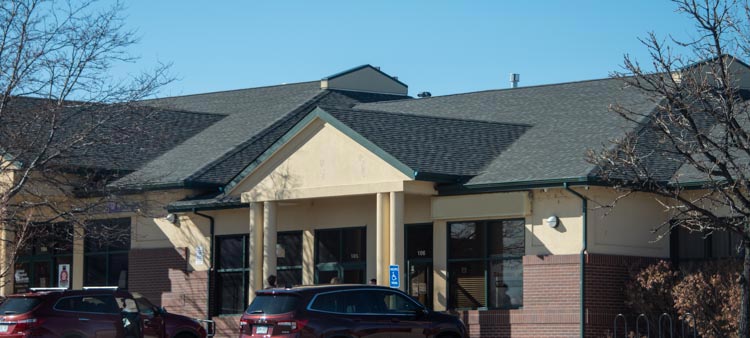If you have a commercial building that has a sloped roof (non-flat), or you’re having a commercial building built that will have a sloped roof, you might be considering commercial roofing shingles. But, what are they? Are commercial roofing shingles different from residential roofing shingles?
We hear some talk in the community about ‘commercial roofing shingles’. Some folks have been told, not by us, that these shingles are more industrial or stronger than regular residential asphalt roofing shingles. This is not the case. Commercial roofing shingles are regular asphalt shingles installed onto a commercial building. That’s it.
What is a Commercial Building
A commercial building or property is real estate intended to generate a profit. This can come from either from goods or merchandise or rental income. Commercial buildings includes manufacturing, warehouses, department stores, office buildings, condominiums, medical and dental offices, hotels, malls, retail stores.
Can You Use Shingles on Your Commercial Building
That depends. If you don’t have a flat roof, yes, you can use asphalt shingles. See our article on how to choose the right roofing material.
If you’re not venting oils, fats, and greases, yes. Asphalt shingles are fine. If you have a bakery or kitchen in your commercial building, you will be venting oil, fat, and grease. Asphalt shingles do not hold-up to these elements. If this is the case, please contact us for a complimentary recommendation.

When To Use Commercial Roofing Shingles
- If the roof pitch on your commercial building is greater than 3/12 or 14º. (Roof pitch is; how much does the roof rise vertically for every 12″ of horizontal distance. A 3/12 pitch roof is a roof that rises 3″ at 12″ of horizontal distance.)
- If other commercial buildings around yours have or will use shingles.
- If you want or need a roofing material that initially costs less.
Asphalt shingles cost the least, initially. If money is your primary, upfront concern, choose regular, everyday asphalt shingles. If spending the least over the long haul, a metal roof should be considered. Although a metal roof cost twice as much as an asphalt shingle roof, it can last twice as long, however. Therefore, a metal roof for your commercial building is worth considering. Keep in mind, there are metal roofing products that resemble asphalt shingles, as well as slate or tile.
When To Not Use Commercial Roofing Shingles
- When your roof is less than 3/12 pitch/14º
- If you will be venting oils, greases, fats, or other flammable substances to the roof, such as a restaurant might do, shingles are not for you. Instead, choose PVC since it is fire resistant and doesn’t break-down nearly as fast as asphalt shingles do when exposed to grease, oil, and fats.
What Type of Shingles Are Best For My Commercial Building
Stone-Coated Metal Shingles
Stone-coated metal shingles are somewhat new to the market – since about the mid-1950s. Since then, they have proved to be a solid roofing choice. They are more expensive than traditional asphalt shingles, initially. About 3 times more expensive. However, because they last often at least 3 times as long as asphalt shingles, they end-up costing less in the long run. Because of these reasons, we feel stone-coated metal shingles are the best shingles for commercial properties.
Asphalt
Most business or commercial building owners don’t want to spend a fortune, yet want a product or material to last long. With those two factors in mind, the asphalt shingles we recommend for commercial buildings are impact resistant and high wind resistant, such as Owens Corning’s TruDefinition Duration series. CertainTeed also makes great asphalt shingles for commercial use. We recommend these roofing products because, although they cost more initially, they last longer than your basic 3-tab roofing shingles, and they have longer warranties. See Are Impact Resistant Shingles Worth the Additional Cost.
What Are The Benefits of Shingles For a Commercial Building
Stone-Coated Metal Shingles
The primary benefit of using stone-coated metal shingles on your commercial building is ROI. We know that as a business owner, you want to spend the least amount of money and a product that’s going to last the longest. Metal is that roofing product, be it stone-coated metal shingles or standing seam metal panels. Although metal costs more initially, it ends-up costing less in the long run. Metal roofing is also more durable than asphalt shingles. Metal withstands hail much better than any other roofing product.
Asphalt
The primary benefit of asphalt shingles, whether for commercial or residential use, is cost. They are the least expensive roofing product, initially. However, in the long run, maybe not. Another benefit to asphalt shingles is that, if a section of your asphalt shingle roof has been damaged, depending upon the severity, it can be repaired. If only a section has been blow-off, those shingles can likely be replaced.
Asphalt shingles are versatile. Because asphalt shingles are relatively small, at roughly 1′ x 3′ per shingle, a small area can be covered. Additionally, since they are made of fiberglass, a shingle can easily be cut, to accommodate any shape of roof. What’s more, they are flexible, so a shingle can be bent, for example, over a round roof deck.
Lastly, asphalt shingles come in a variety of colors and with many features. Owens Corning, a leading asphalt shingle manufacturer, offers 9 lines of shingles. Some resemble wood shake while others resemble slate. Their Duration line of shingles come in 13 different colors.
The Bottom Line
Shingles aren’t for every commercial building’s roof. Most commercial buildings are huge and have heavy equipment on them, such as industrial air conditioners. Shingles are great for small buildings, however, such as a doctor’s office. If you want a roofing product that’s going to last a long time, and cost less at the end of their lifespan, seriously consider stone-coated metal shingles. If you’re wondering if an asphalt shingle roof is right for you but are unsure, contact us for a free inspection and estimate.
